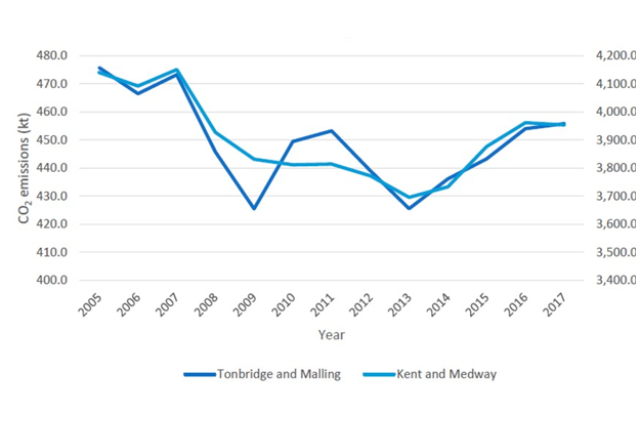Transport
In Tonbridge and Malling CO2 emissions from the transport sector have risen by 7 per cent since 2013.
Figure 3 below shows the carbon emissions from the Transport Sector in Tonbridge and Malling (BEIS, 2019).

Reducing the need to travel using technology and smarter ways of working will help to reduce transport emissions. The council’s adopted digital strategy contains ambitions and actions that support carbon reduction. There are also opportunities to raise public awareness of sustainable travel choices. In addition to reducing vehicle mileage, we will also promote smarter driving and undertake an anti-idling campaign to eliminate emissions from idling engines.
Working with Kent County Council and transport operators to provide an integrated transport system that promotes lower carbon and healthy transport choices within Tonbridge and Malling will also be instrumental in lowering carbon emissions from this sector. The council is seeking options to have a greater influence here through its work with the West Kent Partnership, including the establishment of a new Quality Bus Partnership.
We also have a specific role to play as a licencing authority. By improving the environmental standards of licensed taxis operating in the borough, we intend to reduce emissions from older, more polluting vehicles. We will be running consultations detailing our plans over the next ten years, requiring all taxis to adhere to a vehicle replacement schedule, to meet higher Euro emissions standards and ultimately work towards all taxis becoming Ultra Low Emission Vehicles (ULEV).
Although we do not own a large fleet of vehicles, there are a small number of parking and enforcement vehicles that we will replace to become electric vehicles or ULEV. Similarly, contractors, such as our waste and recycling providers, will be encouraged to use ULEVs in order to undertake work for the council.
A move towards ULEVs will help to reduce transport emissions. Providing the infrastructure to support electric vehicles will be instrumental in facilitating the change to greener vehicles. In order to achieve this change, we have made a commitment to provide electric charging points across the borough, so that it is one of the most welcoming places in the country for driving electric and hybrid vehicles.

